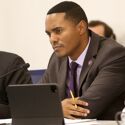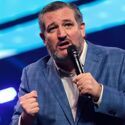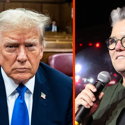
Race and religion found themselves front and center this week. Thanks to Barack Obama, our nation’s again grappling – and hopefully conquering – what the Senator referred to as our “original sin”.
While some citizens are only just now giving race and religion a thorough mulling, Horace Griffin’s never known a life without melanin-induced tension, nor can he remember a time without Christianity.
Griffin’s Pentecostal minister father and Baptist mother made sure to teach their children the scripture. But the scripture Griffin read as a child and the scripture he preaches today are widely different.
Griffin’s parents, community and pastors all preached against homosexuality, providing him with plenty of self-hating fuel for his anti-gay sermons.
It wasn’t until he went to Morehouse, which he describes as historically homophobic, that Griffin actually faced other gay people. Despite what recognition he may have seen, Griffin continued on his anti-Mary way, garnering quite a following – and a tortured soul. Griffin entered seminary after Morehouse, but ended up taking some time off to battle his personal demons.
Upon his return, however, a fellow gay student, who would become his boyfriend, urged Griffin to reread the Bible and see how it had been used to support discrimination. That first step – that rereading of the Bible – led Griffin out of the closet, a narrative that proves central in his book, Their Own Receive Them Not: African American Lesbians And Gays in Black Churches.
Our editor sat down with Griffin this week to discuss race, religion and sexuality here in the United States, particularly in light of Barack Obama’s aforementioned speech. Griffin’s remarks here offer more than just one man’s perspective on racism and homophobia in America, but keen, frank observations on America’s forced ignorance:
I think that most people are still so uncomfortable with race. They just want it to go away. It’s kind of like how they want gays ands lesbians to go away. The average person doesn’t want to work at hard issues. They find it too painful, it makes them too uncomfortable. They don’t want to own their participation in that oppression and change their way of living.
Griffin also offers some insight into the use of the monolithic black church in American politics, particularly with relation to gay Americans, who, he says, are quite right in fearing black religious leaders.
Read all about it, after the jump…
Andrew Belonsky: Let’s start with perhaps an uncomfortable topic. I know you previously preached against homosexuality.
Horace Griffin: Well, at the time, I didn’t think I was gay. You’re taught in the church that if you pray to God, he’ll deliver you from sin. I thought homosexuality was a sin at that time, so I was being delivered from sin and thought I was cured. This was the Anita Bryant period and she was in Florida and I remember giving this high school speech against homosexuality and my teacher actually supported it. So, you have a very homophobic culture both in the church and outside. There was really no one challenging this. It was sort of self-evident.
AB: Did you see the ministry as a way to escape your homosexuality?
HG: It was a sincere thing. I really felt called to this ministry. I was very active in the church all my life, very much into everything the church offered. It was spiritual, but a lot of gay boys in particular go through that “the good boy” syndrome and I think that was playing into my identity and participation in the church.
AB: So, when did you start to crack away at your sexuality?
HG: When I went to college at Morehouse College. My mother really didn’t want me to go. She suspected I was gay and I remember her raising questions about “so many homosexuals” at Morehouse. But I went and I guess it was not so much the consciousness raising, but I did confront homosexuality when I went to college, just because there were many gays on campus. Regardless, I continued with preaching sermons against homosexuality, writing letters in the school newspaper. It didn’t come to a head until the summer after college, when I had my first sexual experience with a man, which was a wonderful experience, but also created major conflict with what I was thinking, my ideology and my theology. It was actually the seminary that challenged my views, where I started having a different perspective about homosexuality.
AB: And what happened there?
HG: I knew of several gay students at seminary and had my first boyfriend, who challenged my sinful view of homosexuality. He said, “We believe this because we were taught it.” For the first time, I thought, “Well, it’s not so self-evident” and then as I studied the Bible in seminary, I began to make some connections with race – the Bible being used to support slavery.
AB: Does that influence your relationship with the church?
HG: I’m so tied to the church – I am a priest, after all – I’m committed to the church, I love the church, but the church often causes me to grieve, because I see the pain and suffering that the church inflicts upon people. I struggle with the church because of that, but I think that the church is going to be here for the rest of our lives, so those of us who are committed to the true gospel must continue to be a voice crying out for people.
AB: Gay people were all over the national landscape during the 2004 election. Now it’s people of color, primarily black people, who are propelling the news stories. Do we always have to have a group that’s the certain apex for debate in American politics? That’s what Obama was saying in his speech this week. Did you get a chance to listen to it?
HG: Yeah, I caught almost all of it. I mean, I thought it was really good, because dealt with race. Race is front and center, race is the issue, but I have a problem when we compartmentalize these issues of oppression. I don’t believe in a hierarchy of oppression. When we talk about racism, we’re also talking about discrimination, we’re talking about bigotry, including that against gays and lesbians. Now, I say that, but let me hasten to say that I think there are time when we just need to deal with racism or just deal with homophobia or sexism. I think there are particular issues that come up that must be addressed, because we don’t all experience life the same way. I don’t experience life as a woman. I don’t have gender oppression. White gays and lesbians aren’t going to go through the same things that blacks – heterosexual or homosexual – are going through: police targeting and having white women grabbing their purses. Those are things that white gay men aren’t going to experience.

AB: Do you think this speech is going to change anything?
HG: Obama has had some really good responses and reviews, but I think that people – I think that most people are still so uncomfortable with race. They just want it to go away. It’s kind of like how they want gays ands lesbians to go away. The average person doesn’t want to work at hard issues. They find it too painful, it makes them too uncomfortable. They don’t want to own their participation in that oppression and change their way of living. My hope is that the speech will bring people in to have a conversation, but the way we respond in this country to issues about race tends to be reactive. There will be some racial incident like the Rodney King beating or the Jena 6 and then people are forced to deal with it and there’s a lot of emotion, but then they just move on. They don’t want to sit down and talk about how we can live a different way. But, I’m hopeful.
AB: We still have a long way to go.
HG: Yes, we do. I think many times whites don’t understand the depths of racism that exist in this country, because they don’t experience it. I was talking to one of my parishioners who was shocked to know that I get these reactions by white women and men all the time. And I’m always dressed professionally in a suit and tie, but I’m lumped with every thuggish black man on the street. A white man dressed like me would never get that reaction. There a lot of people who still feel like any black man – they don’t even look at you – they just lump all black men together as thieves. That is racism. And it’s that level of racism – not people like the Klan, we’re not talking about that racism. A lot of people don’t really look at the nuances of race and the degrees of racism and I really think that’s what Barack was dealing with.
AB: What about the relationship between gays and religion, specifically with regard to black churches. As we said to me before, black preachers made very public denouncements of gays during the 2004 election. Bitterness still remains. Even reading the comments on Queerty, people come out with some broad, pretty distasteful generalizations of black religious figures and the monolithic black church. Do you find that a lot within gay communities or the people with whom you associate?
HG: Yeah, there is that attitude. And generally that is true, because most African-Americans align themselves with the more homophobic Christian denominations – Evangelical, Pentecostal, Baptist and Methodist. That’s where most black people are and we tend not to be in an Episcopal church. The blacks in the Episcopal church are much more open and accepting than your average African-American church goer. I think there is homophobia – we can’t just chalk that up to racism.
AB: How can we reverse that thinking?
HG: We reverse that through education – educating African-American heterosexuals on the issue of homosexuality and sexuality in general and challenging a lot of the traditional scriptural usages that place homosexuality as sin, so it’s actually getting them to think about scripture different, getting them to see gays and lesbians differently and getting them to see the history of oppression that has been condemned by African-Americans. We have to get them to see denigrating gays and lesbians as akin to the racial oppression they opposed.
AB: Do you think there can be actual progress toward equality in the United States without the church’s involvement?
HG: I think history would support just the opposite: the church has not led. That said, I think that in every movement, in every liberation, you have had a significant number of people out of the Christian church and a few denominations who have stood against oppression. I’m thinking of the Quakers with slavery and of the United Church of Christ and the Episcopal Church standing against gay oppression, but I think the church as a whole has not followed the gospel, which calls us to oppose oppression and to deliver people who are oppressed. It’s a real irony that the church, which should be an agent of positive change, participates in the oppression of social groups.


















Kid A
What a courageous and wise man.
rick allen
Yowza! Hot pastor!
fredo777
haha
Rick, I was hoping I wasn’t alone in thinking that. Hand-some.
Charley
Where is his church, what is his religion ? Don’t you think it is important to tell readers about important details ? The photos look phony, like stock b&w vintage 1930 photos in the south. Did Queerty travel to the south to interview him ? Or is it just someone that is attractive living in New York (Chelsea), working as an assistant to a ministry.
Charley
Or maybe even looking for a job in a church. Fill us in on the details.
Charley
That’s the trouble with you, the gay media. Your reports are just Hype. If this was really a black preacher spreading his message in the cotton fields of the south as you have pictured, big hats and print dresses, CNN would be all over the story like flies on shit. You guys are phony, no authenticity.
Charley
The only good thing about your site is David Hauslaib, but he doesn’t speak out enough. Would like to see more of him on Youtube with his political messages. You little New York hacks running this blog are pathetic. Nipping at the heels of great people.
Mary Lou Dobbs
Let’s get to things that Obama has said about race..
Perhaps Obama can answer in his own words: From ‘Dreams of My Father’,
“I CEASED TO ADVERTISE MY MOTHER’S RACE AT THE AGE OF 12 OR 13, when I began to suspect that by doing so I was ingratiating myself to whites”
From Dreams of My Father, ” I FOUND A SOLACE IN NURSING A PERVASIVE SENSE OF GRIEVANCE AND ANIMOSITY AGAINST MY MOTHER’S RACE”.
From ‘Dreams of my Father’, “The emotion between the races could never be pure….. the THE OTHER RACE (WHITE) WOULD ALWAYS REMAIN JUST THAT: MENACING, ALIEN AND APART”
From Dreams Of My Father, “never emulate white men and brown men whose fates didn’t speak to my own. IT WAS INTO MY FATHER’S IMAGE , THE BLACK MAN, THE SON OF AFRICA, THAT I’D PACKED ALL THE ATTRIBUTES I SOUGHT IN MYSELF.
From Dreams Of My Father:
“THAT HATE HADN’T GONE AWAY,” he wrote, BLAMING WHITE PEOPLE,- SOME CRUEL, SOME IGNORANT, sometimes a single face, sometimes just a faceless image of a system claiming power over our lives.”
Charley
Mary Lou,
Yes that is the important thing, not what gay media says. Obama is the next Martin Luther King with a message of change.. He doesn’t need a church or words of Jesus. He is in the here and now.
fredo777
Mary Lou, don’t post those quotes that sound bad out of context if you aren’t going to also post the resolution of those issues also mentioned.